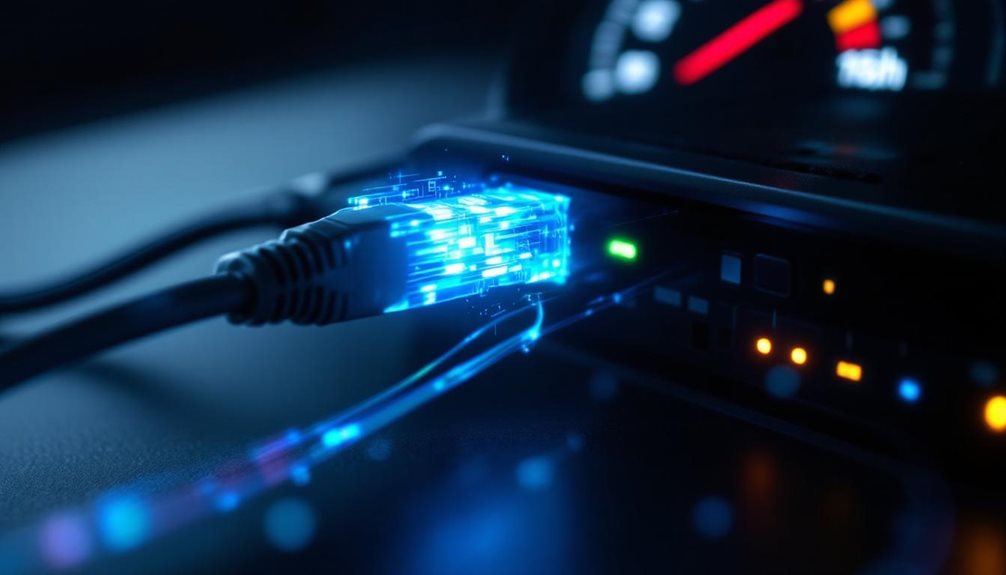A VPN can indeed slow down internet speeds, but the extent varies on several factors. Server distance plays a significant role; connecting to a nearby server usually boosts speed. Overcrowded servers may cause congestion, whilst encryption adds some overhead that can reduce speed too. Using faster protocols like WireGuard can help increase connection speeds. Comprehending these factors can help users refine their VPN experience. For those curious about how to further improve performance, there’s more to investigate.
Factors Influencing VPN Speed
When using a VPN, several factors can greatly influence its speed, much like how traffic congestion in Johannesburg can delay a simple commute.
One major element is server proximity; closer servers tend to lower latency, improving overall speeds. However, if a server is overcrowded, users may experience throttled speeds due to shared bandwidth. Additionally, VPN latency is influenced by distance from the server, which can further impact connection quality. Server bandwidth can also be a critical factor, as an overloaded server may slow down your connection even if you are close to it.
Server proximity significantly impacts VPN speeds; closer servers reduce latency, but overcrowding can lead to throttled performance.
Moreover, the choice of VPN protocol plays an essential role; faster options like WireGuard can outperform heavier protocols like OpenVPN.
The user’s internet speed also matters; a slow base connection from your local South African ISP can’t be magically sped up by a VPN.
Finally, provider limitations, such as data caps and throttling policies, can further hinder performance.
Understanding these factors helps users navigate their VPN experience more effectively.
Optimising VPN Performance
Maximising VPN performance is essential for users seeking a seamless online experience. By making a few strategic adjustments, one can greatly improve speed and reliability. Here are key tips to consider:
- Connect to geographically proximate servers to lower latency. Choose servers in Johannesburg, Cape Town, or other major South African cities when available.
- Prioritise servers with lower user loads to avoid congestion during peak hours. This can be especially important as ISP throttling may intentionally reduce VPN connection speeds or overall bandwidth.
- Experiment with protocols like WireGuard for faster speeds, particularly beneficial for streaming popular platforms like DStv Now and Showmax. VPN protocols can significantly impact both security and speed, so testing different options is recommended.
- Switch servers by substantial numbers to bypass regional bottlenecks that may affect connections between South Africa and international destinations.
- Use a provider with a large, diversified server network that includes African server locations for optimal choices.
Implementing these practices can lead to smoother browsing, streaming, and gaming experiences.
It’s all about fine-tuning the connection for maximum efficiency, ensuring that the VPN serves its purpose without causing unnecessary slowdowns whilst maintaining reliable access to both local South African content and international services.
Understanding Encryption and Its Impact
Encryption plays an essential role in the domain of VPNs, ensuring that data remains secure whilst traversing the internet. However, this security comes at a cost. The encryption and decryption processes consume CPU and GPU resources, particularly with complex algorithms like AES-256. This additional workload can introduce a 5-10% data overhead, affecting overall speed. Lightweight protocols, such as WireGuard, help mitigate these effects compared to older options like OpenVPN. On the flip side, stronger encryption may slow down activities requiring high data transfer. Moreover, the choice of server proximity and routing efficiency greatly influences latency, highlighting the delicate balance between security and speed in VPN use. For KZN businesses, encrypted tunnels provide essential protection whilst maintaining broadband connectivity across multiple locations. Notably, VPNs can prevent slowdowns during streaming or gaming, helping South African users make informed choices when selecting VPN services for their online security needs. Proper VPN implementation ensures uninterrupted access to business resources whilst protecting sensitive data transmission across networks.
